


Advanced Digital Audio Production Lab
33 E. Ida B. Wells Drive, Lower Level
Work on projects at 14 production stations equipped with MBox Pro interfaces and an extensive suite of audio software, including Avid’s Pro Tools, Apple’s Logic, and Cycling 74’s Max. You can also record audio in the lab’s two professional voiceover booths.Read More
Advanced Physics Lab
The Advanced Physics Lab is a fully computerized laboratory dedicated to the study of classical mechanics. In this modern environment, students conduct a variety of physics of motion experiments. The data is automatically recorded and interpreted by dedicated computers, thus allowing students to focus on the physical interpretation of results, rather than the tedious data collection and manipulation.

Anechoic Chamber
33 E. Ida B. Wells Drive, Lower Level
Take accurate acoustic measurements or record your own dry, non-reverberant sample library in this room designed to absorb sound waves and vibration. Read More
Animation Production Spaces
916 S. Wabash Ave., 1104 S. Wabash Ave.
Access the latest technology, tools, and equipment for your hand-drawn, stop-motion, and computer animation projects.Read MoreASL Lab
The ASL Lab is a resource and media center available to all students, faculty, staff, alumni and the interpreting community. Resources include computers; recording devices; more than 500 books on ASL linguistics, Deaf studies and interpretation; and more than 600 ASL-related DVDs and CDs. Students also work with Deaf tutors in the lab.
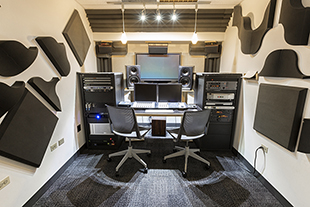
Audio Post-Production Mini-Suites
33 E. Ida B. Wells Drive, Lower Level
Collaborate with your peers or work individually on music, sound art, or sound-for-picture projects in these private setups.Read More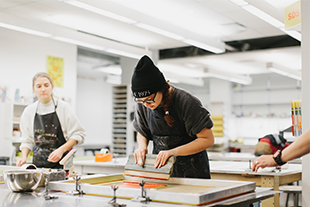
Book, Paper, and Printmaking Facilities
623 S. Wabash Ave. and 1104 S. Wabash Ave.
We have everything you’ll need to explore book arts, hand papermaking, letterpress, and printmaking. With four distinct studios spread across two buildings, you’ll have plenty of space to experiment. Read More
Chemistry/Biology Lab
The Chemistry/Biology Lab houses courses in general chemistry and biology. It is a modern environment that entices students to explore relevant topics in chemistry and biology. Topics addressed include chemical reactions and solution stoichiometry, atomic structure and periodicity, DNA structure and replication, the chromosomal basis of inheritance, protein synthesis, and genetic engineering.

Chemistry/Multipurpose Lab
The Chemistry/Multipurpose Lab is a state-of-the-art facility supporting courses in biology, chemistry, forensic sciences, material science and physics of musical instruments. In addition, the department’s outreach programs use this lab.

Club DJ Classroom and Lab
33 E. Ida B. Wells Drive, Room 715
This smart classroom features 15 Serato/Traktor workstations and three portable Club DJ Serato/Traktor workstations with flash recorders for hands-on experience during class time. If you're taking related classes, you can reserve the room for practice and to complete assignments.Read More
Collaborative Space
33 E. Ida B. Wells Drive, 2nd Floor| Room 227
The space was redesigned in 2019 to allow courses in communication, Journalism, PR, advertising, strategic Communication, and civic media to build a learning environment in supporting student‐centered, agency‐based models of learning. The design of the room allows a deeper engagement in socially-responsive, team-based problem solving, and moving inquiry-based models of connected learning to the center of our curriculum.Read More
Columbia Chronicle Newsroom
33 E. Ida B. Wells Drive, 2nd Floor
The student-run Columbia Chronicle newsroom is a state-of-the-art facility for the production of the award-winning newspaper and its website. The Newsroom houses the most advanced equipment used to gather and report news in print, online, and social media.Read More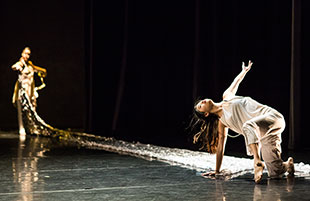
Dance Spaces
1306 S. Michigan Ave.
Columbia’s School of Theatre and Dance has plenty of space for you to move—including a professional theater. We also have a dedicated sound and technology lab so you can create your own work. Read More
Earth Sciences Lab
The Earth Sciences Lab houses courses dedicated to studying the scientific principles governing Earth and its operation. It provides a rich collection of minerals and maps facilitating hands-on activities for students to explore Earth materials and how they form, surface processes and how they shape the land, and so on. Here, students become aware of geologic time, of the history of Earth and life on it, of climate and climate change, and of the impact of human activities on Earth.

Electronics Lab
The Electronics Lab is designed to support students working with physical computing in the context of installation and performance. The lab is outfitted with arduino microcontrollers, components and tools for circuit prototyping especially alternative input sensors, and surveillance cameras for exploring computer vision.

Environmental Sciences Lab
The Environmental Sciences Lab is a multidisciplinary science lab housing biology, ecology and environmental sciences courses. Students learn through extensive, hands-on laboratory activities and studying contemporary issues such as air and water pollution; global climate change; ozone depletion; acid rain; hazardous and solid waste; alternative energy resources; soils; deforestation; overfishing; biodiversity; and endangered species, as well as their ecological, economical and human health impacts.

Equipment Cave
916 S. Wabash Ave.
Need a camera or game console to finish your digital media project? The Equipment Cave contains an extensive collection of equipment available on a check-out basis to Interactive Arts and Media students. Assets include: game consoles, augmented reality and virtual reality (AR/VR) equipment, high-definition video cameras, digital SLR cameras, microphones, tripods, audio recorders, laptops, mobile devices, drawing tablets, and more.Read More
Equipment Centers for Film and Television
1104 S. Wabash Ave., 1600 S. State St.
Access camera and lighting equipment and supplies at four equipment centers located across campus. Read More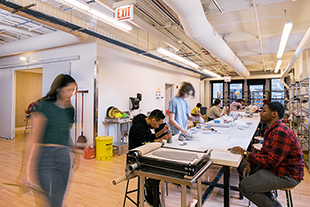
Fabrication Facility
623 S. Wabash Ave., 10th Floor
Experience 15,000 square feet of state-of-the-art equipment in Columbia’s central making space. With the latest machines, power tools, and equipment, you can create everything from jewelry to 3D models to furniture in one collaborative space. Read MoreFabrication Lab
This center for research in electronics, physical computing, tactile media and advanced imaging includes a computer-controlled laser cutter, large-format printer, solder stations, motion sensors, electronics components (transistors, resistors) and a robotics locker.

Fashion Lab
623 S. Wabash Ave., 7th Floor
Take your garments from concept to reality in the fashion lab, with all the industry-standard equipment and software you’ll need to make runway-ready garments under one roof.Read MoreFashion Study Collection Research Center
The Research Center is a workspace and archive in the Fashion Study Collection. The facility offers access to rare books on fashion and dress, magazines, journals, visual media, and other reference materials, dating as early as the 1840s through the present day. General subjects addressed in the Research Center include fashion history, construction, dress and fashion theory, designers, exhibitions, ethnic dress, and textiles. Individual appointments and class visits to the Fashion Study Collection are held in its Research Center.

Film Row Cinema
1104 S. Wabash Ave., 8th floor
Film Row Cinema is our 260-seat, state-of-the-art theatre for film screenings, lectures, discussions, and debates.Read More
Game Lab
916 S. Wabash Ave.
This center for student-led game research includes PC- and console-gaming hardware, including both current generation consoles as well as an archived collection, a high-definition AV system, and a library of several hundred video game titles.Read More
The Getz Theatre Center
72 E. 11th St.
The Getz Theatre Center has four professional-quality stages, a state-of-the-art scene shop, stocked costume shop, and dedicated makeup/prosthetics and lighting labs. Read MoreHAUS
HAUS functions both as a hangout and study area for students, as well as an events space. The room has a nightclub feel, with a small stage for concerts, comedy acts and readings.Read MoreHaus
Located in the Quincy Wong Center, Haus functions as a hangout area, study space and a student-run performance venue. Students of all majors can gain hands-on experience by programming the space, which features sound reinforcement and lighting equipment.Read MoreHigh-Tech ASL Lab
The High-Tech Lab has a Sony Soloist Language Lab system that can be used for recording ASL, as well as interpreting class work or homework. It features a teacher console for monitoring student progress. The lab is flexible and facilitates a wide variety of courses and student needs.
Hokin Gallery
Hokin Gallery is a student-run exhibition space that’s home to the Hokin Project, an arts management practicum that provides gallery management, exhibition, curatorial and design experience for students of all majors. It presents the work of the Columbia community through programs, events and exhibitions. This program is a collaboration of the School of Business and Entrepreneurship and Student Affairs/Student Spaces for Art and Collaboration (SSAC).Read More
Installation Labs
There are three dedicated installation laboratories in the 916 S. Wabash building. Each of these impressively flexible rooms have plywood-behind-drywall walls, numerous power outlets and network connections along the ceiling and floor, and unistrut grid.
Letterpress Studio
Equipped with Vandercook presses and two Kelsey platen presses, our excellent letterpress printing facilities also house a Shniedewend Washington-style hand press, American French Tool Etching Press and a Heidelberg Windmill. We maintain a growing collection of wood and metal type. We have approximately 400 cases of metal type and 130 cases of wood type, as well as 20 cases of 19th century wood type.

Live and Installed Sound Spaces
33 E. Ida B. Wells Drive, Lower Level
This facility supports classroom and lab activities for students in the School of Audio and Music. Hardware includes a Digico SD8 console, which feeds a high-power 7.3 sound reinforcement/playback system, a 64-channel HD recording system, and a 12-mix high-output stage monitor system.Read MoreLow-Tech ASL Lab
The Low-Tech Lab is an ASL-only environment where students can meet to do homework, work with Deaf tutors, or read Deafness or ASL-related books from our resource library.
The Makerspace
754 S. Wabash Ave., 2nd Floor
The Makerspace is a student-centered arts, crafts, and fabrication studio that encourages and supports student creativity outside the classroom during the academic year. The Makerspace exists to promote hands-on skill development and foster a sense of community among makers. The Makerspace offers a wide variety of tools, materials, and workshops within a large dynamic space for students to collaborate, prototype, learn new making skills, and practice hobbies. Read More
Media Production Center
1600 S. State St.
Learn, collaborate, and create in our 35,500-square-foot, professional-quality media-making space with three film production soundstages, prep and production spaces, and classrooms. Read More
MFA Studios
The MFA Studios at the 1104 S. Wabash building provide a space for graduate students only to work on and develop studio projects.

Microbiology Research Lab
This lab supports faculty research, and it is used for community engagement activities.

The Music Center
1014 S. Michigan Ave.
Columbia’s School of Audio and Music has more than 50 spaces for rehearsing, composing, recording, and performing. Read More
Offset Printing Studio
The Center owns a Heidelberg GTO; each year, two graduate offset fellows have the opportunity to apprentice in this studio.

Open Lab
916 S. Wabash Ave.
This major hub of student work and research includes three dozen computer workstations with superb hardware performance and the latest in high-end media production and application development software and game engines.Read More
Open Studio
623 S. Wabash Ave., 8th Floor
Need creative space that’s not your living room? Work in our open studio: it’s okay if paint drips on the floor. Read More
Organic Chemistry Lab
The Organic Chemistry Lab is a state-of-the art facility dedicated to the hands-on study of carbon-containing compounds and their derivatives. Laboratory activities include micro-scale techniques, basic separations, purifications and syntheses, as well as infrared spectroscopy and instrumental analysis.
Papermaker's Garden
This innovative garden, managed by Columbia’s Center for Book and Paper Arts, provides a hands-on education in growing, harvesting and using plant fibers for art. Students learn how green spaces reduce air pollution and urban runoff, and how interdisciplinary artistic practices using science, art and the environment can change the way we live. The garden also serves as an art installation and public venue, adding color and energy to the South Loop.
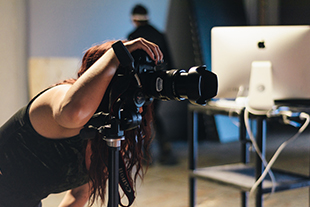
Photography Facilities
623 S. Wabash Ave., 600 S. Michigan Ave., and 1104 S. Wabash Ave.
Photography students have access to a state-of-the-art ink jet print lab and lighting studio, as well as extensive darkrooms. Read More
Physics and Electronics Lab
The Physics and Electronics Lab is dedicated to the hands-on study of phenomena from the unanimated world: acoustics, electronics, optics, lasers and holography. Students learn and explore fundamental concepts about sound, light and electricity. They also learn about quantum and optical phenomena leading to the creation and use of lasers, as well as the procedures for setting up simple holograms and electronic circuits.

Post-Production Audio Suite
1104 S. Wabash Ave., Room 706
Add, edit, or mix sound for your projects in the Post-Production Audio Suite. Facilities include a 15-station Pro Tools computer lab, a Foley stage, four 5.1 surround sound Individual Editing rooms, and two large Audio Mixing Stages.Read More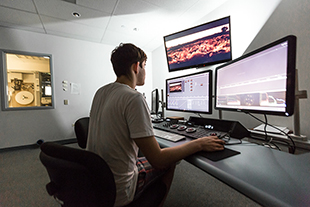
Post-Production Center
1104 S. Wabash Ave., Room 602
Complete all your post-production needs with our industry-standard systems and spaces for editing, effects, color correction, finishing, and mastering. Read MorePrivate Lab Studios
There are four private recording studios available for student use. They can be used for recording ASL videos, small group discussions or ASL tutoring sessions.
Pro Tools Production Lab
The computer lab features industry-standard software and design tools for music production and business productivity. The software in this space is used to support the curriculum and teach students practical skills applicable in any industry.

Raw Space Black-Box Venue
The Raw Space Black-Box venue is a 2,000-square-foot multifunction lab for staging work, lectures, events, exhibits, screenings, photo shoots and performance. The space has 12 2.4K dimmers; four 2.4k cyberpaks; a 2x24 leprecon lighting board; LANbox DMX controller, which can be controlled by Isadora or MaxMSP; dozens of stage lighting instruments; and network access throughout. Additionally, the department has a sound reinforcement cart with a Mackie 14x2 mixer and four QSC speakers appropriate for indoor or outdoor performance.
Recording Studio
This studio is the department's flagship digital music production facility for Music Business Management courses. It houses advanced equipment that allows students to learn through hands-on experience.
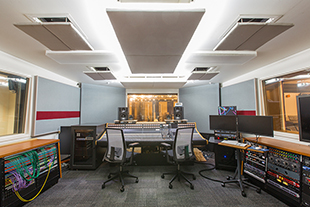
Recording Studios and Control Rooms
33 E. Ida B. Wells Drive, Lower Level
Fine-tune your skills in our professional-level music production facilities. Used for course projects and in-class instruction, we have three control rooms linked to two studio spaces, complete with absorption/diffusion panels for a variety of instrumental setups and access to the Audio Arts and Acoustics' musical instrument collection, including a Yamaha C7 grand piano.Read More
Reverberation Chamber
33 E. Ida B. Wells Drive, Lower Level
Built from an old bank vault, our reverberation chamber is a unique opportunity for sound engineers and audio enthusiasts to record and measure audio. You can use the chamber as a recording space as well—it’s fully connected to our classrooms and recording studios via a high-resolution network.Read More
Screening Rooms
1104 S. Wabash Ave.
The School of Film and Television has 6 small and medium-sized screening rooms, plus the 260-seat Film Row Cinema, located in the 1104 S. Wabash building for class film screenings and events. Read More
Sound Studio
916 S. Wabash Ave.
This room for advanced audio and mixing includes a sound booth mixer, surround sound, and software to edit and mix the recordings for games, animations, or other interactive pieces.Read More
Television Studios
600 S. Michigan Ave., 15th floor
Experience working on professional TV studio sets with industry-standard equipment that includes three multi-camera HD studios, two control rooms, camera jib, and a 40-foot green screen cyclorama.Read MoreTheatre Center
The Theatre Center has a variety of performance and production venues for Columbia’s plays, musicals, concerts, and directing projects.Read More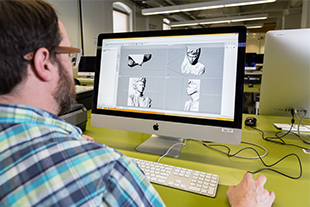
Computer Lounge
623 S. Wabash Ave., 9th Floor
Edit, design, and sketch the day (or night) away in the computer lab. Work on the latest professional software for Mac OS and Windows, with expert staff on-hand to help along the way. Read More
WCRX 88.1 FM
33 E. Ida B. Wells Drive, 1st floor
WCRX (88.1 FM) is Columbia’s student-run and operated FM radio station, broadcasting in the heart of the nation's third largest radio market and streaming to the world. WCRX has an impressive array of modern radio technology and services including various broadcast, production, and news studios, remote broadcast facilities, full Associated Press Radio services, and heavily integrated student-run social media and web presences.Read More